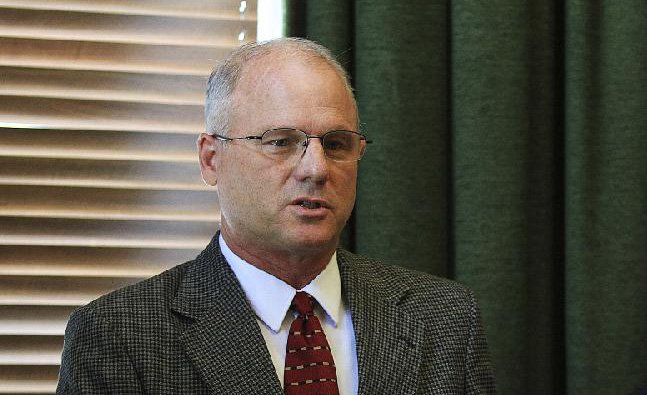Drug-court participants who worked at a plastics factory owned by state Sen. Jim Hendren without pay and under threat of incarceration are entitled to damages equal to the amount of the minimum wage and overtime pay, a federal judge has ordered.
U.S. District Judge Timothy Brooks ruled late Friday evening that participants who stayed at a DARP Inc. facility, a drug and alcohol recovery program in Decatur, in lieu of jail time and worked at Hendren Plastics Inc. in Gravette, acted as employees and that the defendants were joint employers under the state's minimum wage act.
Hendren "held the keys to the prison cell, so to speak, through its ability to notify DARP whenever a worker performed unsatisfactorily and would not be permitted to return to work," Brooks said in the filing.
Brooks partially granted the motion for summary judgment by plaintiffs Mark Fochtman, Shane O'Neal and other class members who participated in the recovery program, holding the defendants "liable for any damages that are determined to be owed to the class for failure to pay minimum-wage and overtime compensation, as well as an equal amount of liquidated damages."
Brooks deferred a ruling on the total amount of damages owed, questioning what in-kind deductions to consider for the defendants. He also threw out the motions for summary judgment from DARP and Hendren, who argue they were not employers and the plaintiffs were not employees under the minimum wage act. Even if an employment relationship existed, they argue, the drug-court participants signed their wages away before entering the program, court filings show.
The plaintiffs, at one time, faced criminal charges related to substance abuse and agreed to participate in the recovery program in lieu of punishment in the criminal-justice system, but were not convicted of crimes. After signing an "admission agreement" upon entry of the program, they were offered "a bed space at one of its two 60-bed facilities in Decatur, as well as meals, clothing and basic hygiene supplies and transportation to and from a job at Hendren's for-profit plastics factory," Brooks wrote. They also knew that if they did not complete the program "they would be returned to the drug court to face the prospect of prison time."
After the court's ruling, Hendren, a Republican from Gravette, said in a statement that he was very disappointed and would be appealing the decision.
"I continue to believe that rehabilitation and recovery efforts are preferable to filling our prisons with nonviolent drug and alcohol offenders," he said. Hendren is the president pro tempore of the Arkansas Senate and is a nephew of Gov. Asa Hutchinson.
"Rather than obtaining help recovering from addictions as well as workforce training and employment opportunities, this ruling will ensure offenders will fill our already full prisons and jails where they will be far more likely to become career criminals," he said.
Brooks said the program offered a competitive advantage to Hendren in the form of a cheap labor supply that showed up to work on time, every day, and in return, DARP would be paid a lump sum check for their services that was equal to the workers' wages. None of the money went to the drug-court participants, except in the form of a stipend that could be up to $1,000, if they completed the yearlong program.
"All he was doing was preying on people less fortunate than him," attorney John Holleman said about Hendren. "It's reprehensible."
Holleman & Associates of Little Rock represent the plaintiffs in the case and estimate damages as high as $1.2 million. According to Holleman, the drug-court workers at Hendren clocked over 76,000 regular hours and over 1,600 overtime hours from Oct. 23, 2014 until the present.
In the partial summary judgment, the court deferred part of the plaintiffs' motion because it wasn't clear if the defendants were entitled to the full 30-cent credit for in-kind services, like housing, food and medical supplies, or whether any "stipends" paid by DARP should be deducted from the total damages owed, Brooks said in the court filing. He has given the plaintiffs until Friday to explain their positions on the matter.
In DARP's tax returns, it claimed to have paid $178,988 as stipends from August 2014 through July 2018, which included the many drug-court participants it housed and did not work at Hendren but at other unnamed employers. In addition to the facility in Decatur, there are two in Tahlequah, Okla. During that time frame, founders Raymond and Lynn Jones paid themselves $517,950 in salaries, according to tax returns.
"I do not regret trying to help when asked by Arkansas Drug Courts to assist people wanting to turn their lives around," Hendren said in his statement. "It is an undisputed fact that Hendren Plastics paid more than minimum wage for every hour worked. I do regret that our justice system has been so abused. However we are confident justice will prevail in the end."
The initial lawsuit, filed in Benton County Circuit Court on Oct. 23, 2017, included a similar drug-court program, Christian Alcoholics and Addicts in Recovery in Jay, Okla., and Siloam Springs company Simmons Foods, which owns poultry plants and relies on chicken farms in Arkansas and Oklahoma. The case moved to the Western District of Arkansas weeks later, and was severed in February 2018, with claims against Simmons and Christian Alcoholics and Addicts in Recovery being transferred to the Northern District of Oklahoma where other similar class-action lawsuits awaited. The claims against DARP and Hendren stayed in Arkansas and were amended a month later.
The case in Oklahoma is ongoing.
"I certainly think the [Oklahoma] judge would be persuaded by Judge Brooks' opinion," said attorney Timothy Steadman. Currently, the defendants face allegations of racketeering, human trafficking and labor-law violations for forcing drug-court participants to work in chicken plants without pay.
"We're very satisfied with the court's judgment and we're looking forward to working on the rest of the case," Steadman said.
Business on 10/02/2019

